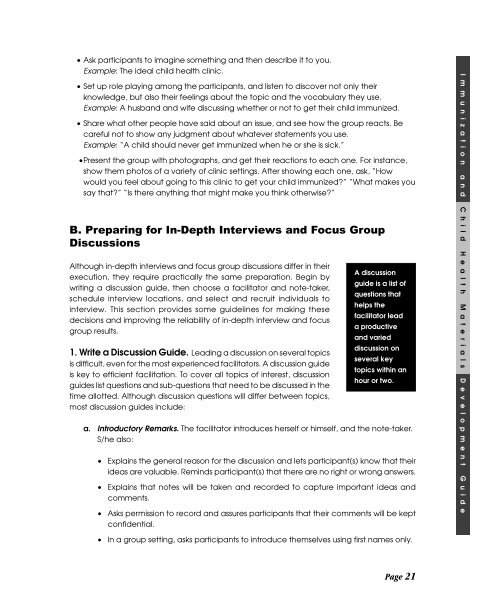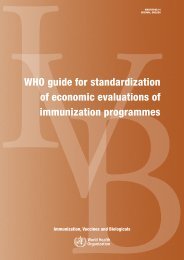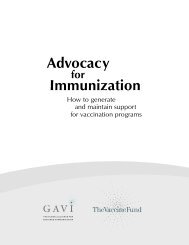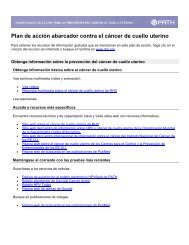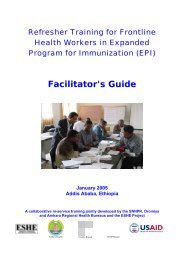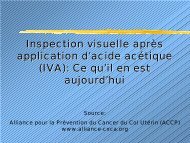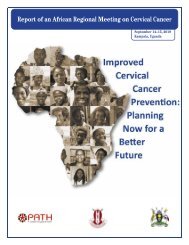Immunization and child health materials development guide pdf
Immunization and child health materials development guide pdf
Immunization and child health materials development guide pdf
Create successful ePaper yourself
Turn your PDF publications into a flip-book with our unique Google optimized e-Paper software.
• Ask participants to imagine something <strong>and</strong> then describe it to you.<br />
Example: The ideal <strong>child</strong> <strong>health</strong> clinic.<br />
• Set up role playing among the participants, <strong>and</strong> listen to discover not only their<br />
knowledge, but also their feelings about the topic <strong>and</strong> the vocabulary they use.<br />
Example: A husb<strong>and</strong> <strong>and</strong> wife discussing whether or not to get their <strong>child</strong> immunized.<br />
• Share what other people have said about an issue, <strong>and</strong> see how the group reacts. Be<br />
careful not to show any judgment about whatever statements you use.<br />
Example: “A <strong>child</strong> should never get immunized when he or she is sick.”<br />
•Present the group with photographs, <strong>and</strong> get their reactions to each one. For instance,<br />
show them photos of a variety of clinic settings. After showing each one, ask, “How<br />
would you feel about going to this clinic to get your <strong>child</strong> immunized?” “What makes you<br />
say that?” “Is there anything that might make you think otherwise?”<br />
B. Preparing for In-Depth Interviews <strong>and</strong> Focus Group<br />
Discussions<br />
Although in-depth interviews <strong>and</strong> focus group discussions differ in their<br />
execution, they require practically the same preparation. Begin by<br />
writing a discussion <strong>guide</strong>, then choose a facilitator <strong>and</strong> note-taker,<br />
schedule interview locations, <strong>and</strong> select <strong>and</strong> recruit individuals to<br />
interview. This section provides some <strong>guide</strong>lines for making these<br />
decisions <strong>and</strong> improving the reliability of in-depth interview <strong>and</strong> focus<br />
group results.<br />
1. Write a Discussion Guide. Leading a discussion on several topics<br />
is difficult, even for the most experienced facilitators. A discussion <strong>guide</strong><br />
is key to efficient facilitation. To cover all topics of interest, discussion<br />
<strong>guide</strong>s list questions <strong>and</strong> sub-questions that need to be discussed in the<br />
time allotted. Although discussion questions will differ between topics,<br />
most discussion <strong>guide</strong>s include:<br />
A discussion<br />
<strong>guide</strong> is a list of<br />
questions that<br />
helps the<br />
facilitator lead<br />
a productive<br />
<strong>and</strong> varied<br />
discussion on<br />
several key<br />
topics within an<br />
hour or two.<br />
a. Introductory Remarks. The facilitator introduces herself or himself, <strong>and</strong> the note-taker.<br />
S/he also:<br />
• Explains the general reason for the discussion <strong>and</strong> lets participant(s) know that their<br />
ideas are valuable. Reminds participant(s) that there are no right or wrong answers.<br />
• Explains that notes will be taken <strong>and</strong> recorded to capture important ideas <strong>and</strong><br />
comments.<br />
• Asks permission to record <strong>and</strong> assures participants that their comments will be kept<br />
confidential.<br />
• In a group setting, asks participants to introduce themselves using first names only.<br />
Page 21


